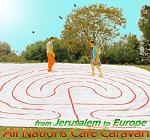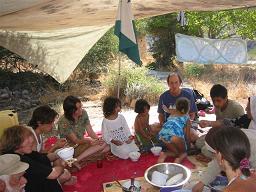 The second week of August was one to remember. While the eyes of the whole world were turned to the war in Lebanon and Gaza, a group of Palestinians and Israelis managed to live and work together and create a sense of family of women, men and children who trust and help each other, and feel deeply related to each other.
The second week of August was one to remember. While the eyes of the whole world were turned to the war in Lebanon and Gaza, a group of Palestinians and Israelis managed to live and work together and create a sense of family of women, men and children who trust and help each other, and feel deeply related to each other.
We chose a valley where a Palestinian village used to be, close to the Israeli-Palestinian border, the green line, with some houses and stone terraces still intact, and within a short distance from both Jerusalem and Bethlehem. The idea was to intuitively reconstruct the old way of life that had been throbbing in the veins of this valley.
Our site was just a kilometer away from the Israeli army checkpoint, where Palestinians are not allowed to go any further. A couple of times soldiers were sent to inspect us. At one time, they interrogated the people they found at the camp site and eventually decided to leave us alone. At other times, they were simply friendly and accepted our presence there as a fact, even at a time of war, when a closure had been in effect to prevent Palestinians from coming so close as we were to Jerusalem.
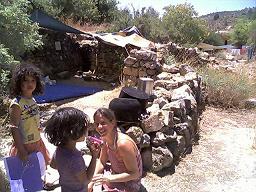 The local people, including the original owners of the land, accepted us whole heartedly, expressing a hope for continuing our presence in Ein-Haniya. The local people, including the original owners of the land, accepted us whole heartedly, expressing a hope for continuing our presence in Ein-Haniya.
A couple of days after the camp ended, Lisa and Dhyan went with Abed to Dheishe refugee camp to visit Abu-Adel, a beautiful 73 year old Palestinian, who used to live near Ein-Haniya until 1948. He told us that they used to stay outdoors during the fruit picking season and the boy scouts used to come there to have a summer camp each summer, much like ours. He added that the place where we held our dinner parties and harvest moon celebration, was the same place where in the old days they used to bring all the grain at the harvest season and hold a Hafla, a celebration with traditional food and dancing, for the farmers and their families.
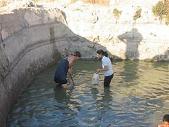 We begun the week by clearing rocks, making a path and stairs to walk down the hill, setting up a big tent and a kitchen tent and cleaning the old house we used for sleeping and creative sessions. Daphna and Ali, working side by side without knowing each other's language, looked like a picture from the 19th century, when the first east European Jewish idealists came to Palestine to work side by side with the local farmers. We begun the week by clearing rocks, making a path and stairs to walk down the hill, setting up a big tent and a kitchen tent and cleaning the old house we used for sleeping and creative sessions. Daphna and Ali, working side by side without knowing each other's language, looked like a picture from the 19th century, when the first east European Jewish idealists came to Palestine to work side by side with the local farmers.
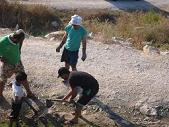 The first theme of the camp was our relationship with the natural surrounding, the earth and water, the fire and the air, the animals and plants growing around us, and the people who live in our proximity. We took time to clean the Ein-Haniya pool and the mountain spring that feeds it, and to redirect the precious water that had been spilling on the road to nourish the thirsty agricultural terraces. The first theme of the camp was our relationship with the natural surrounding, the earth and water, the fire and the air, the animals and plants growing around us, and the people who live in our proximity. We took time to clean the Ein-Haniya pool and the mountain spring that feeds it, and to redirect the precious water that had been spilling on the road to nourish the thirsty agricultural terraces.
We were led by two local farmers, Abed and Muhammad, to their plots of land on the hill right above the army check point, where we received fresh cucumbers and local herbs, za'atar and sage, from simple and remarkable people who love and care for their land.
The other theme of the camp was inspired by the Harvest Full Moon night at the middle of the week, which since biblical times marked the Love Festival, when young women used to come out to dance in the fields and the young shepherds went after them to look for brides.
We invited guests to join us for a celebration that night, with music, belly dancing and an original production of Romeo and Juliet, where Ali from Palestine played a young man who fell in love with Israeli Miriam, but his mother (played by his 17 year old daughter May) forbade the relationship. We had a happy end, of course, with reconciliation and a wedding, but not before Romeo's brother (played by Ali's 9 year old son Murat) had a Karate fight with Miriam's sister (played by Amit, a 13 year old girl from the north of Israel who came to find refuge from the war).
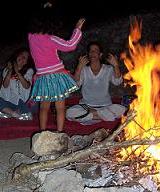 The chant of the camp "One People One Planet One Spirit" was translated to Arabic and Hebrew for this event by May and Dhyan, and Daphna invented the movements to go with it, so we could all sing and learn a dance of universal peace. Later, our own Esperanto expert Jeremi completed the song with this universal language of peace. The chant of the camp "One People One Planet One Spirit" was translated to Arabic and Hebrew for this event by May and Dhyan, and Daphna invented the movements to go with it, so we could all sing and learn a dance of universal peace. Later, our own Esperanto expert Jeremi completed the song with this universal language of peace.
The Palestinian kids, enjoying Lisa’s endless care and support, were confident enough to communicate non verbally with the Jewish families who came to swim at the pool. Though shocked at first, the Israelis, coming from Jerusalem and from West Bank settlements, quickly learned to appreciate the spirit of our camp, and begun offering us their floats and even expressing words of hope and faith in this kind of Arab-Israeli relationships.
At the end of the camp, we all felt a longing to stay together and not to say goodbye. Some of the participants suggested to prolong the camp, and others said we should open there a permanent caf? for our gatherings of great love. We agreed to have a fair well party in three days time, after which we will decide how to continue our work there.
The vision that came out of this camp is an All Nations Cafe, a meeting point of hearts and family on the border of Israel and Palestine, with people from both sides reconstructing the fabric of life that was there for many centuries and is still a strong, viable and uplifting possibility for all of us today.
|

 The second week of August was one to remember. While the eyes of the whole world were turned to the war in Lebanon and Gaza, a group of Palestinians and Israelis managed to live and work together and create a sense of family of women, men and children who trust and help each other, and feel deeply related to each other.
The second week of August was one to remember. While the eyes of the whole world were turned to the war in Lebanon and Gaza, a group of Palestinians and Israelis managed to live and work together and create a sense of family of women, men and children who trust and help each other, and feel deeply related to each other. We begun the week by clearing rocks, making a path and stairs to walk down the hill, setting up a big tent and a kitchen tent and cleaning the old house we used for sleeping and creative sessions. Daphna and Ali, working side by side without knowing each other's language, looked like a picture from the 19th century, when the first east European Jewish idealists came to Palestine to work side by side with the local farmers.
We begun the week by clearing rocks, making a path and stairs to walk down the hill, setting up a big tent and a kitchen tent and cleaning the old house we used for sleeping and creative sessions. Daphna and Ali, working side by side without knowing each other's language, looked like a picture from the 19th century, when the first east European Jewish idealists came to Palestine to work side by side with the local farmers.
 The local people, including the original owners of the land, accepted us whole heartedly, expressing a hope for continuing our presence in Ein-Haniya.
The local people, including the original owners of the land, accepted us whole heartedly, expressing a hope for continuing our presence in Ein-Haniya.
 The first theme of the camp was our relationship with the natural surrounding, the earth and water, the fire and the air, the animals and plants growing around us, and the people who live in our proximity. We took time to clean the Ein-Haniya pool and the mountain spring that feeds it, and to redirect the precious water that had been spilling on the road to nourish the thirsty agricultural terraces.
The first theme of the camp was our relationship with the natural surrounding, the earth and water, the fire and the air, the animals and plants growing around us, and the people who live in our proximity. We took time to clean the Ein-Haniya pool and the mountain spring that feeds it, and to redirect the precious water that had been spilling on the road to nourish the thirsty agricultural terraces.  The chant of the camp "One People One Planet One Spirit" was translated to Arabic and Hebrew for this event by May and Dhyan, and Daphna invented the movements to go with it, so we could all sing and learn a dance of universal peace. Later, our own Esperanto expert Jeremi completed the song with this universal language of peace.
The chant of the camp "One People One Planet One Spirit" was translated to Arabic and Hebrew for this event by May and Dhyan, and Daphna invented the movements to go with it, so we could all sing and learn a dance of universal peace. Later, our own Esperanto expert Jeremi completed the song with this universal language of peace.